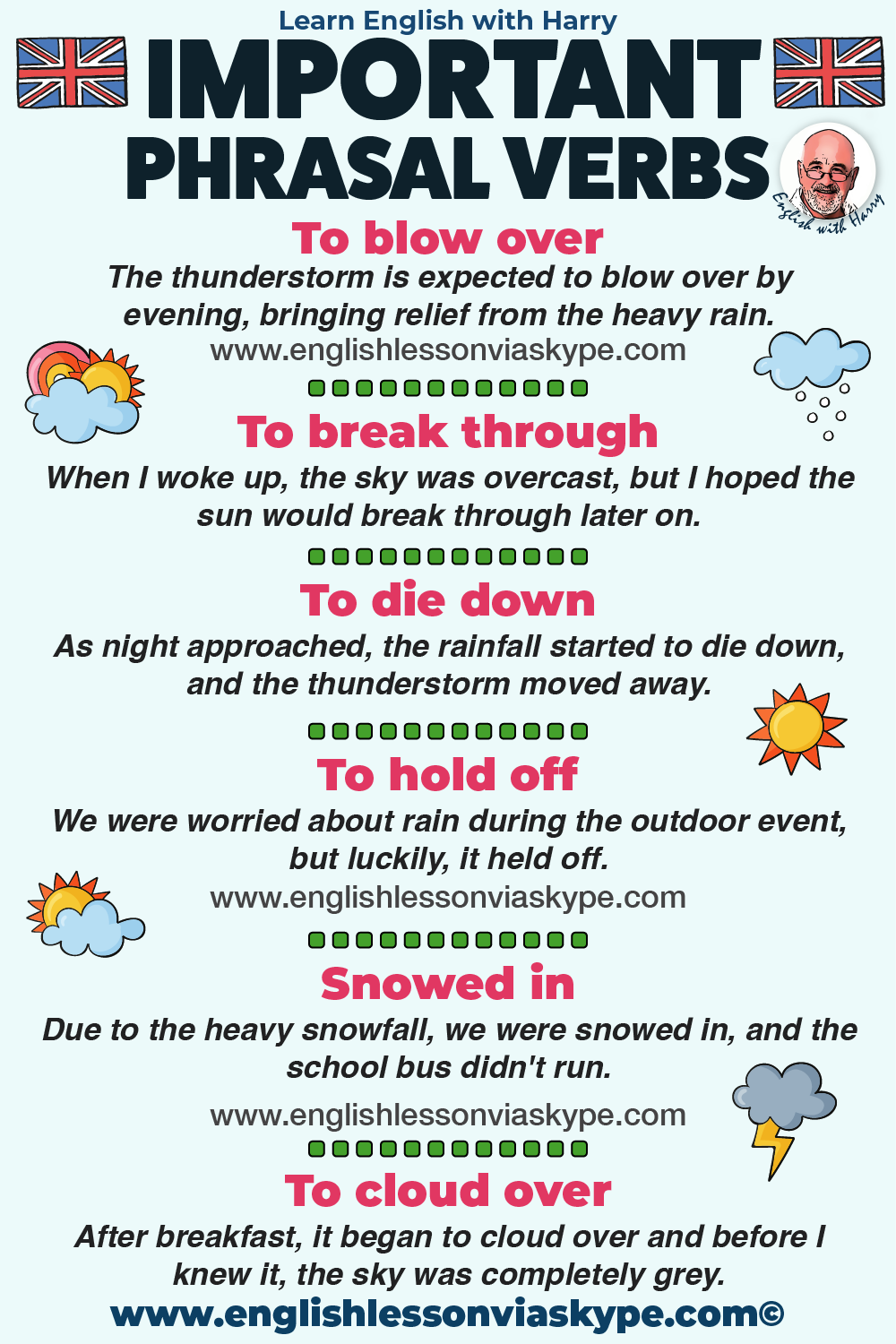Learn weather phrasal verbs. You can’t be fluent in English if you don’t know these phrasal verbs.
In this lesson, you will learn phrasal verbs crucial for your speaking skills. This is the most popular topic in English for small talk conversations and also the easiest for starting a conversation with a native speaker to sound natural.
Listen to the podcast Speak Better English with Harry or watch it on YouTube at Learn English with Harry. englishclass101
List of phrasal verbs
Weather Phrasal Verbs
Harry
So today, we’re talking about the weather. Phrasal verbs related to weather.
And weather is a really, really important topic here in Ireland and also in the UK. Everybody talks about it. I’m not surprised that the weather is usually pretty bad. And when we get it good, we like to talk about it anyway. And when it’s bad, we like to talk about it even more.
So these weather phrasal verbs are really, really important to help you understand what English people are referring to when they talk about the weather in their daily conversations.
improve english on a budget
Online English Courses from €7.99
brighten up
Meaning: the sky is clearing, bringing more sunlight and improving the weather
Examples:
I really hope it will brighten up so we can have our picnic, eat some tasty snacks, and play fun games.
I think the weather will brighten up later. The forecast said it would.
When the storm passed, the sky began to brighten up, and it stopped raining.
Even in winter, the day can brighten up if there are no clouds in the sky.
cloud over
Meaning: sky becomes covered with clouds, often leading to a decrease in sunlight
Examples:
After breakfast, it began to cloud over and before I knew it, the sky was completely grey.
The sunny day quickly clouded over, and it started to rain.
We were enjoying the hike when the sky started to cloud over, and we could hear distant thunder.
Weather Phrasal Verbs

clear up
Meaning: the improvement in weather conditions occurs when the sky becomes less cloudy or the rain stops
Examples:
The weather forecast says that they expect it to clear up by lunchtime.
After the morning rain, the weather is expected to clear up. It’s the perfect time to hit that golf ball.
warm up
Meaning: the temperature is rising, and the weather is becoming milder or more comfortable
Examples:
The morning started at 9 degrees, but it warmed up to 12 degrees by lunchtime.
The day started chilly, but it’s gradually it’s warming up.
As spring arrives, the weather begins to warm up, bringing a sense of renewal and growth.
cool down
Meaning: a decrease in temperature, often resulting in a more comfortable condition
Examples:
As we transition from summer to autumn, the weather naturally cools down.
It’s great that the weather cooled down a bit, I’ll be able to sleep at night.
book your trial English Lesson
break through
Meaning: the sun comes out or clouds clear after bad weather
Examples:
When I woke up, the sky was overcast, but I hoped the sun would break through later on.
I hoped the sun would break through so I could enjoy my walk in the park.
pick up
Meaning: weather conditions to improve or become more pleasant; increase in wind speed
Examples:
The long-term weather forecast predicts that it will pick up next week.
As we move into spring, the temperatures are expected to pick up, bringing warmer and more enjoyable days.
After a calm morning, the wind picked up in the afternoon, bringing a refreshing breeze to the area.
die down
Meaning: a decrease in intensity or strength, particularly when describing winds or storms
Examples:
Storm Debi brought gusts of more than 70 mph to parts of the UK and Ireland, but over time, the wind has died down.
The rain died down to a gentle drizzle.
As night approached, the rainfall started to die down, and the thunderstorm moved away.
Weather Phrasal Verbs

blow over
Meaning: a storm or strong winds are ending or moving away
Examples:
By lunchtime, the rain had blown over, and we could enjoy our day outdoors.
That will blow over in a couple of hours; let’s not change our plans.
The thunderstorm is expected to blow over by evening, bringing relief from the heavy rain.
hold off
Meaning: the bad weather, like rain, is delayed or postponed, so good conditions last longer
Examples:
Let’s wait and see if the weather holds off.
We were worried about rain during the outdoor event, but luckily, it held off.
The forecast predicted rain, but I hope it holds off so that I can get my washing dry.
snowed in
Meaning: heavy snowfall prevents people from leaving a particular location, such as a house, building, or community
Examples:
Due to the heavy snowfall, we were snowed in, and the school bus didn’t run.
I called the office to inform them that I was snowed in and wouldn’t be able to make it to work.
So here are some really useful weather phrasal verbs. It’s a great topic for conversations in English. Understanding these phrasal verbs, their meanings, and how to use them is very important.
So, practice them. Look at your weather and see if any of these weather phrasal verbs describe what you’re experiencing.
If you need help, you know what to do – visit www.englishlessonviaskype.com. I’m happy to assist and provide more examples. This is Harry, saying goodbye. Thanks for being part of the lesson. Thanks for listening, and join me for the next one!
speak better English with Harry podcast- episode 459
more information
For more information on English grammar rules, English collocations and English idioms, check out the links below:
English verbs expressing sounds
You can always study English advanced level at Learning English with the BBC and British Council Learn English.





